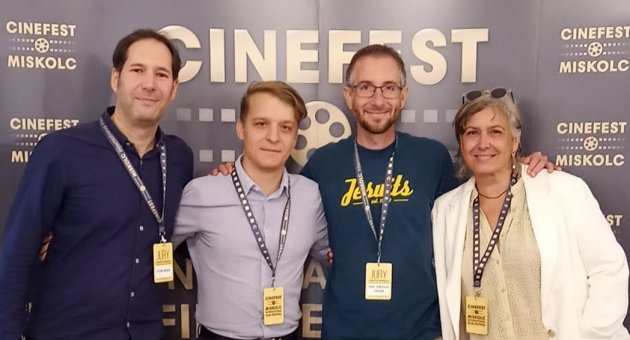At Cinefest the joint Ecumenical Jury of SIGNIS and INTERFILM awarded the film Apples, describing a situation that mirrors the difficult pandemic times in which we live and presenting a way to deal with loss and to find meaning in life.
In the last 16 years the CineFest Miskolc International Film Festival became the most well-known and, based on the feedbacks, the most popular film festival of Hungary. In every September the film professionals and the audience have a chance to watch the most outstanding, most valuable films of the year – mostly for the first time, since all films in the competition program and the Open Eye selection are Hungarian premieres.
The Festival works together with several international organizations. Beside the International Federation of Film Critics, which sends a jury of well-known film critics to the Festival, also Church related professional organisations participate at the event.
SIGNIS is a non-governmental organization that includes members from over 100 countries. As the "World Catholic Association for Communication", it brings together radio, television, cinema, video, media education, Internet, and new technology professionals. INTERFILM is the international network for the dialogue between church and film. It promotes the appreciation of cinema’s artistic, spiritual and social significance in the church and calls attention to the relevance of church, theology and religion for cinema. The two organisation jointly delegates an International Ecumenical Jury also to Cinefest.

The Ecumenical Jury in Miskolc 2021, from left: András Petrik, Tamás Vígh, Piero Loredan, Mia Lund Rao
Prize of the Ecumenical Jury
The Ecumenical Jury in Miskolc 2021 awarded its prize to "Apples" (Mila) by Christos Nikou, which also won the Adolph Zukor Prize of the Ferstival. The festival's main prize, the Emeric Pressburger Award, went to "Wheel of Fortune and Fantasy" (Guzen to sozo) by Ryûsuke Hamaguchi from Japan. The film has already been awarded the Grand Jury Prize (Silver Bear) at the Berlinale 2021. The Fipresci Jury awarded the International Film Critics' Prize to "Espíritu sagrado" (The Sacred Spirit) by Chema García Ibarra from Spain.
The film Apples – describing a situation that mirrors the difficult pandemic times in which we live – “presents a way to deal with loss and to find meaning in life”.
With very accurate and minimalistic visuality, the movie leads us to reflect about the healing power of loving your neighbour and living an authentic life beyond the risk of isolation we are facing in our social media society.
Furthermore, “Apples opens up horizons for discussions and reflections at several levels about human relations, the complexity of every person, and the spiritual meaning of life,” reads in the press release of the organisation.
INTERFILM acts in an ecumenical context. As film constitutes a global form of expression and communication, so INTERFILM is committed to ecumenism: a mutual understanding beyond the limits of confessions, churches and religions. INTERFILM joins church and cinema, cultures and religions. INTERFILM exists since 1955 and functions with a honorary management. Its activities are supported by different churches and cooperation partners as festivals and filmcultural organisations.
International festivals are the hot spots of film culture where the diversity of world cinema unfolds. Thus festivals are critical for the activities of INTERFILM. INTERFILM participates in festivals through ecumenical, interreligious or solely Protestant juries which award prizes to outstanding films. By his members INTERFILM supports the distribution of the awarded films in their respective countries. Besides Berlin, Cannes, and Venice, INTERFILM is represented at numerous other festivals such as Miskolc, Karlovy Vary, Locarno, Montreal, or Yerevan. Church film juries award prizes to films which are of high artistic quality; lend expression to a human viewpoint corresponding with the message of the Scripture, or stimulates debate with the Biblical tradition; and make audiences sensitive to spiritual, social and ethic values.
The connections between church, religion and film are either direct and obvious, or complex and hidden. Elements of religious traditions are reflected in the stories and symbols, images and parables of films as well as in common values, attitudes and visions. In order to explore and comprehend this multilayered relationship INTERFILM regularly organizes seminars and conferences, often in cooperation with ecumenical partners.
The Reformed Church in Hungary has been a member of the international organisation since 2017 as an institutional partner. In August 2020 four enthusiastic Hungarian INTERFILM private members committed to films decided to set up a Hungarian member organization on the model of Interfilm Switzerland. At the end, altogether 13 people founded the Interfilm Hungary Association.
Interfilm Hungary works at the local level with the support of the international organization and along its goals. The main reason for the establishment of the Hungarian organization was that the founders believed that there were more opportunities for an association here, in Hungary if it could act with the approval of the international organization, but still independently. The aim was to work closely with other Hungarian initiatives (organizations, film schools, film-related companies etc.), to organize film seminars and conferences independently, and participate as a jury in regional partner film festivals.